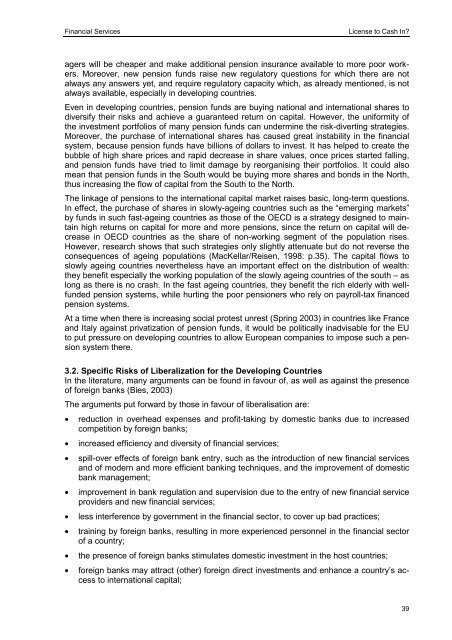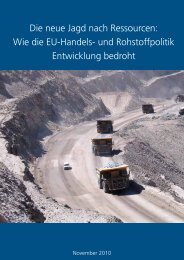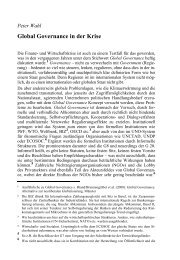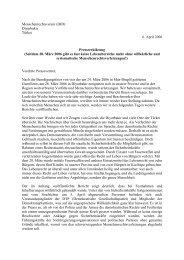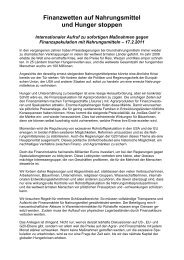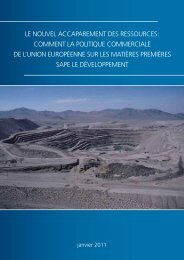Financial ServicesLicense to Cash In?Consolidation is, ironically, a response by the financial industry to increased competition, inorder to increase profits. The EU requests for more market opening in financial services(through full ownership and otherwise) and the GATS liberalisation of financial services ingeneral have increased this worldwide competition. Strong competition among financial servicesleads to difficult dilemmas. 47 On the one hand, it may enhance the efficiency and lendingof the banks with the resulting benefits of lower prices for consumers and the wholeeconomy. On the other hand, more competition may tempt banks to engage in too-risky lending– as was the case in the Asian financial crisis – and other practices that destabilise thebanking industry, which has very costly repercussions for the economy.These issues are increasingly being discussed at top governmental levels. According to arecent finding(Canoy et al., 2001), many forms of competition do not endanger financial stability,and in cases where competition does affect financial stability, the appropriate safeguardis sound prudential regulation or good corporate governance, rather than limiting competition.This means, however, that the functional regulatory and supervisory authorities haveto be in place and efficient, in order to guarantee fair competition, which is not always thecase in many developing countries. Governments thus have to be cautious when liberalisingfinancial services, in cases where national and international instruments designed to dealwith the risks of greater competition are not in place.Due to increasing competition and pressure to step up profitability, as well as to successfulrequests by the financial sector for more deregulation, ever more international banks tend tobe integrated banks i.e. active in a number of types of financial services (e.g. banking, insuranceand securities). More competition among banks due to GATS might increase this tendency.However, while increased integrated banking brings with it such benefits as reducedcosts, more product diversity and cross-subsidisation of the different activities within the financialcompany, it also involves such risks as conflicts of interests between the differentservices (as seen at the major investment banks), more concentration of economic – andhence political – power, the greater difficulty for the authorities in monitoring integratedbanks, and the necessity of providing “safety nets” for those activities of a financial servicecompany which go beyond banking (Claessens/Klingebiel, 2001, p. 19-44).3.1.6. The impact of the EU’s request for liberalising pension fund managementThe EU has made requests to many developing countries to liberalise their pension fundmanagement services. Such expansion of European pension fund services to the rest of theworld could introduce imprudent practices in other parts of the world. Pension fund managementhas increasingly relied on buying shares to provide the necessary returns on capital tofinance current and future pensions. When share value decreased dramatically and pensionfunds lost money, it became clear how risky this strategy had been and how it could endangerthe provision of pensions by these privatised systems. For instance, the Dutch pensionfunds and their managers invested 46% of their capital funds in shares on the national andinternational stock markets as of June 2002. In 2003, it was revealed that many pensionfunds could not fulfil their obligations any longer, as the return on investments over the previousthree years had been 30% less (i.e. around €135 billion less!) than expected by the fundmanagers: in May 2003, one in five pension funds had mismanaged the funds used to coverfuture pension payments. The pension fund supervisory authorities had to intervene to forcepension funds to come up with strategies to ensure all future payment obligations. Now, newincome is generated by increased contributions by employees and employers – decreasingworkers’ income and companies’ profits – or by lowering payments to pensioners. At thesame time, some pension funds are restructuring or merging, decreasing their numbers. Inthe UK, pension funds face similar problems.Experience in Latin American countries shows that the benefits of pension reform and privatisationhave been overestimated, and that the administrative costs are high (Queisser/Reisen,1997). The question is whether European and other foreign pension fund man-47 See for instance recent World Bank research on bank concentration and competition.38
Financial ServicesLicense to Cash In?agers will be cheaper and make additional pension insurance available to more poor workers.Moreover, new pension funds raise new regulatory questions for which there are notalways any answers yet, and require regulatory capacity which, as already mentioned, is notalways available, especially in developing countries.Even in developing countries, pension funds are buying national and international shares todiversify their risks and achieve a guaranteed return on capital. However, the uniformity ofthe investment portfolios of many pension funds can undermine the risk-diverting strategies.Moreover, the purchase of international shares has caused great instability in the financialsystem, because pension funds have billions of dollars to invest. It has helped to create thebubble of high share prices and rapid decrease in share values, once prices started falling,and pension funds have tried to limit damage by reorganising their portfolios. It could alsomean that pension funds in the South would be buying more shares and bonds in the North,thus increasing the flow of capital from the South to the North.The linkage of pensions to the international capital market raises basic, long-term questions.In effect, the purchase of shares in slowly-ageing countries such as the “emerging markets”by funds in such fast-ageing countries as those of the OECD is a strategy designed to maintainhigh returns on capital for more and more pensions, since the return on capital will decreasein OECD countries as the share of non-working segment of the population rises.However, research shows that such strategies only slightly attenuate but do not reverse theconsequences of ageing populations (MacKellar/Reisen, 1998: p.35). The capital flows toslowly ageing countries nevertheless have an important effect on the distribution of wealth:they benefit especially the working population of the slowly ageing countries of the south – aslong as there is no crash. In the fast ageing countries, they benefit the rich elderly with wellfundedpension systems, while hurting the poor pensioners who rely on payroll-tax financedpension systems.At a time when there is increasing social protest unrest (Spring 2003) in countries like Franceand Italy against privatization of pension funds, it would be politically inadvisable for the EUto put pressure on developing countries to allow European companies to impose such a pensionsystem there.3.2. Specific Risks of Liberalization for the Developing CountriesIn the literature, many arguments can be found in favour of, as well as against the presenceof foreign banks (Bies, 2003)The arguments put forward by those in favour of liberalisation are:• reduction in overhead expenses and profit-taking by domestic banks due to increasedcompetition by foreign banks;• increased efficiency and diversity of financial services;• spill-over effects of foreign bank entry, such as the introduction of new financial servicesand of modern and more efficient banking techniques, and the improvement of domesticbank management;• improvement in bank regulation and supervision due to the entry of new financial serviceproviders and new financial services;• less interference by government in the financial sector, to cover up bad practices;• training by foreign banks, resulting in more experienced personnel in the financial sectorof a country;• the presence of foreign banks stimulates domestic investment in the host countries;• foreign banks may attract (other) foreign direct investments and enhance a country’s accessto international capital;39


